Resilience through Regenerative Agriculture: SAVA Style
The latest results on the DLC-CURSA Agroecology program, 2019-2021
By Ardhilles Andriantinefiarijaona, Anicet Elcar Ranaivoson, Nestorine Manantenasoa, Emilien Razafindrabozy, Rostella Christine, Esperio Jaozandry, Donatien Betalata, Nandrasana Judolin Raherison, and James Herrera. Published September 28, 2021.
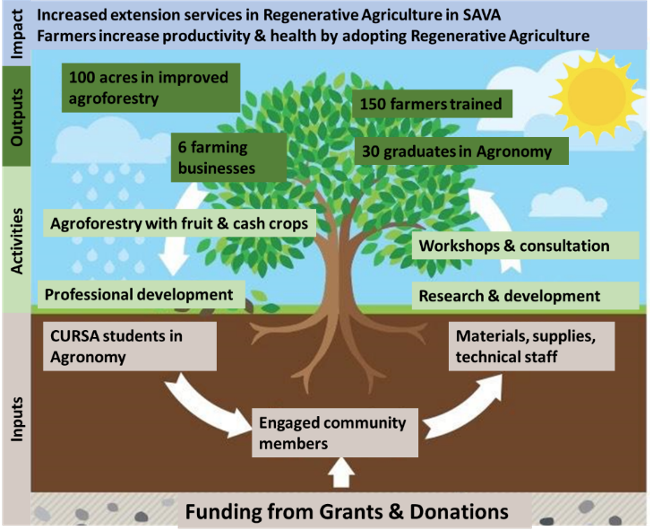
The DLC-SAVA theory of change for regenerative agriculture.
Since 2019, the DLC-SAVA Conservation program has been collaborating with the local university to train farmers and university students principles of regenerative agriculture and agroecology (1). Our goal is for farmers to be more resilient to crises, and university personnel better able to provide extension services in regenerative agriculture. Different crises challenge agriculture in Madagascar, with the current economic crash (2) exacerbating year-to-year volatility in crop prices (3). Further, natural disasters are becoming more common with climate change including droughts, floods, wildfires, and cyclones (4). Farmers must be prepared. By engaging with the university and diverse actors in the agricultural sector, the DLC is supporting a network of leaders to teach and implement agricultural practices that simultaneously benefit both people and biodiversity.
During the last two years, systems of all kinds have been shaken, from local to global scales. Conservation, development, and research projects around the world found themselves struggling to adapt to the new realities of lockdowns, outbreaks, and economic crash (5). In Madagascar, the disease impacts of COVID-19 have been reduced by travel restrictions into and out of the country, as well as the demographics, infrastructure, and policy within the country. The economic impacts, however, are of a scale that has not been experienced in over a decade (2). With 70-80% of the population relying directly on natural resources for their rural livelihoods, this translated to increased pressure on threatened habitats (5). Farmers across the country experienced food insecurity, with those in the south afflicted by a mass famine resulting in over a million people in desperate need of humanitarian aid (6).
DLC staff and lead farmers at three villages were first trained by the NGO Terra Firma International’s Peter Jensen (1, 7). Partnering with the university in the SAVA region, CURSA, we continued to learn through rigorous research and practice, consulting with our partners, and refining our methods (8). New training opportunities with professionals in the vanilla, coffee, and cacao sectors have expanded our scope. Now, almost 300 farmers are engaged in peer-to-peer exchange with a diverse network of professionals.
Through monthly consultations with trainees and lead farmers, the CURSA team of extension agents are supporting farmers in their transition to regenerative agriculture. They are also conducting research about the process of adoption, socioeconomics related to agriculture, nutrition, and health. These consistent and in-depth interactions with communities are forging trust, respect, and mutual understanding among all parties.

The first regenerative agriculture trainees in SAVA, 2019. Almost 50% of these farmers in the first workshops went on to make their own home gardens using the methods they learned. Several have become lead farmers, fully implementing regenerative agriculture in their fields and teaching others. They have now become local trainers, and are participating in more advanced workshops in vanilla cultivation. We have continued to follow up with these farmers to assist and monitor their progress.
Results So Far
To summarize outputs to date, 11 interns (seven women, four men) in agronomy at CURSA and three staff (one woman, two men) are lead extension agents, training and consulting farmers in regenerative agriculture and nutrition. Three students graduated from CURSA this year with their research thesis based on our agroecology activities.
Almost 300 farmers (65% women) in six villages are participating in the DLC-SAVA – CURSA Regen Ag program. 217 farmers (72% women) are engaged in the subsistence and market vegetable farming focus, and 77 (40% women) in the agroforestry focus. In the first two years of the project, 40% of participants in the vegetable farming focus have implemented the techniques they learned in their own fields. Approximately 78% of participants in the agroforestry program have successfully adopted new techniques, planting over 3,300 seedlings on their lands. Those farmers who have adopted new methods have grown between 1-10 new crops (average of 2 tree crops and 2.5 vegetable crops), and vegetable farmers are rotating crops to enjoy multiple harvests throughout the year. Staple crops include nutritious green leafy vegetables which are eaten every day, as well as polycultures with classic combinations such as corn, beans, and squash (“three sisters” planting). Over 3,300 tree seedlings were planted by farmers after training by DLC and CURSA staff, with an average survival of 82% in the first year. Of these, 1,300 were native forest trees, almost 670 were fruit trees, and the other ~1,200+ were cash crop trees including cloves, cacao, and coffee.
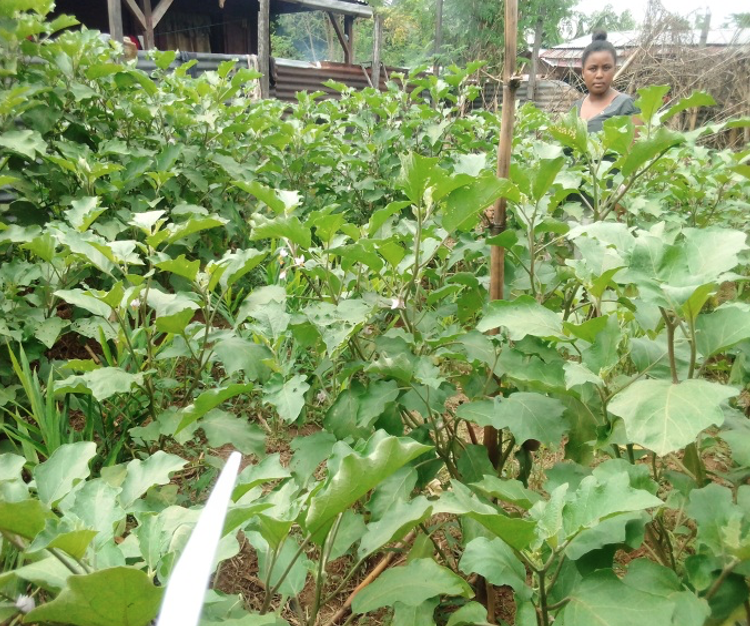
Estanie from Manantenina is one of the vegetable farming participants who has skillfully implemented regenerative agriculture, here showing off her aubergine and ginger forest.
With communities at four villages, we have initiated large-scale agroforestry, planting over 60,000 trees on a total of 69 hectares (165.6 acres) in 20219. The partnering communities were consulted to determine what their goals are, the kinds of trees they want to plant, and to write collaborative agreements clearly defining roles and responsibilities that were signed. At each plantation, 15,000 – 20,000 trees were planted, including a mix of native, fruit, and cash crop trees, as well as fast-growing, nitrogen-fixing trees that help to initiate the restoration of the otherwise barren landscapes. The communities are motivated to continue these efforts, and we have established new tree nurseries or greatly expanded existing ones to reach our goal of 100,000 trees to plant in 2022.
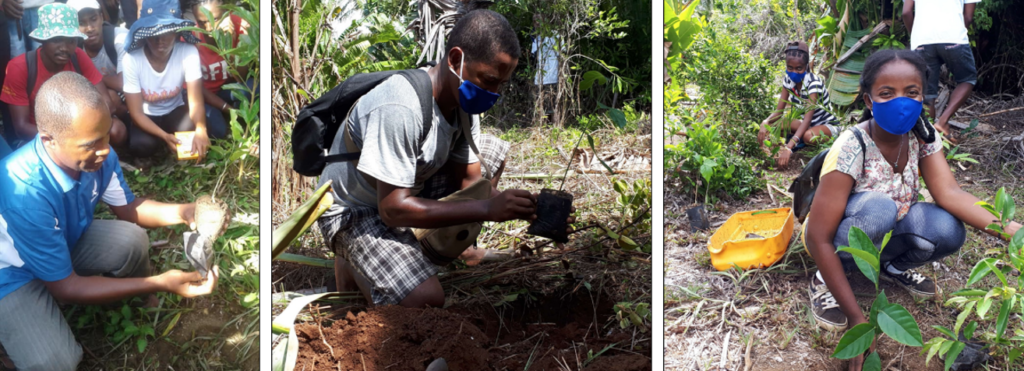
University director Christophe Manjaribe (left) took the lead to plant over 16,000 seedlings at their demonstration ‘food forest.’ Ardhilles (middle) has led the collaborative activities between DLC and CURSA to promote agroecology in SAVA, and staff and students (right) also came to help support the effort.
Women’s Workshops
Because women are fundamental to the agricultural value chain, yet are typically underrepresented in opportunities for training, we began workshops specifically focused on empowering women in agriculture (10). We have now held four workshops run by women exclusively for women. During these workshops, women learn the regenerative agriculture approaches to market vegetable farming, with directed learning towards their individual needs. Through the DLC-CURSA regenerative agriculture collaboration, we are helping women farmers at two communities to create cooperative associations that will allow them to maximize their access to training and markets.

The women’s regenerative agriculture team workshop in Mandena, July 2021. Thirty women were trained by five women leads, including Mdm Nestorine teaching about nutrition, and Mdm Emilienne, lead vegetable farming intern.
In addition to training in farming, Mdm Nestorine Manantenasoa leads supplementary sessions for women on proper balanced nutrition and what she calls Sakafo Maro Loko: Food of Many Colors. Malnutrition and food insecurity are ever-present threats in Madagascar, leading Mdm Nestorine to design research and development to address these issues. Through presentations and hands-on skills development, women learn about diversifying their diets, especially with readily available plant-based proteins, fruits, and vegetables, as well as proper hygienic food preparation methods. Women prepare a nutritious and delicious lunch and enjoy the fruits of their labor during a picnic together.

After learning about proper nutrition and hygienic food preparation, everyone enjoyed the fruits of their labor with a group lunch.
Staff Research
The three CURSA staff who are engaged in this project are also conducting research for their Ph.D.s: Mdm Nestorine, Mr. Ardhilles Andriantinefiarijaona, and Mr. Anicet Eclar Ranaivoson.
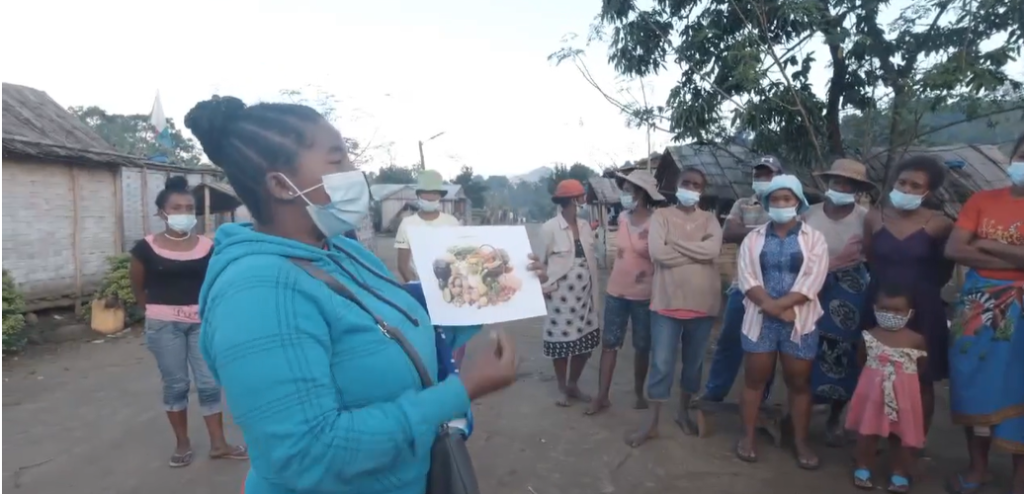
Mdm Nestorine speaks about nutrition and dietary diversity.
Mdm Nestorine is focusing on dietary diversity, food security, and health as related to agricultural practices. In addition to the interview research to understand these issues, she has also applied her knowledge to create a plant-based nutritional supplement powder high in protein, iron, vitamin A, starchy carbohydrates, and fats that are so critical to undernourished children and mothers. She plans to mass-produce this powder, made from readily available local materials, and provide it at low cost to mothers and infants in rural communities.
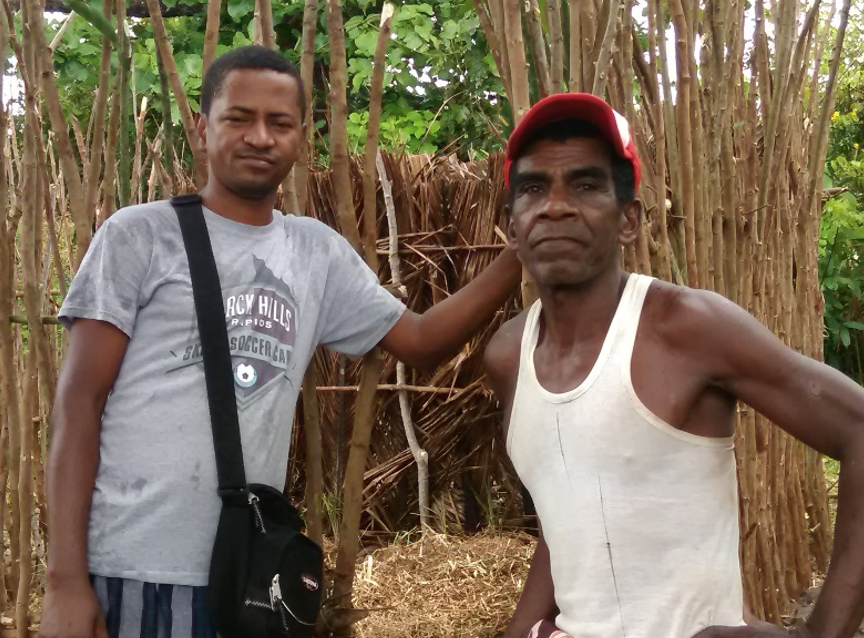
Ardhilles (left) with one of the lead farmers, Jeannot, as they discuss and consult on farming practices.
Mr. Ardhilles Andriantinefiarijaona is focusing on the socioeconomics of farmers in relation to crop diversity and agricultural practices. With vanilla being such an economic engine in the SAVA region, he seeks to understand how it influences farmer decisions about land use and the relationship to deforestation. He especially aims to develop strategies for farmers to earn fair wages for their crops and increase resilience through diversification.
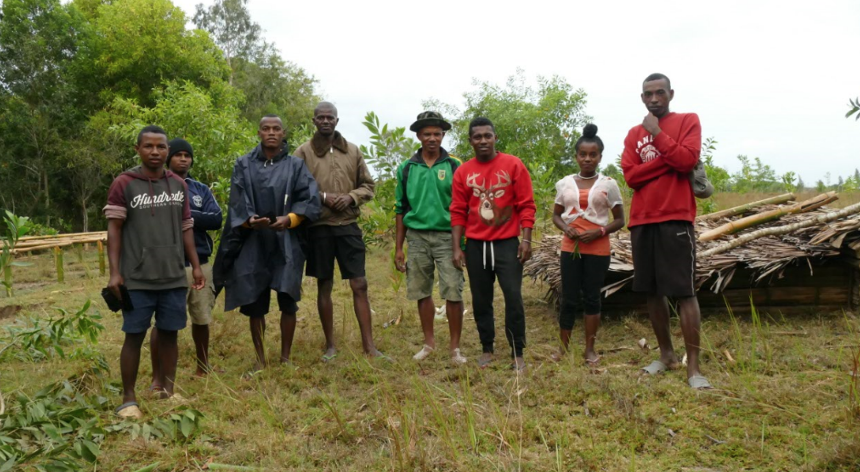
Anicet, third from the right, with the CURSA and Amboronala teams at their new tree nursery. After weeks of training and preparation, the nursery is already being stocked with over 25,000 potted tree seedlings
Mr. Anicet Eclar Ranaivoson is focused on best practices in agroforestry, variation in seedling survival according to species and planting design, and the benefits of agroforestry for farmers. He has led the efforts to forge partnerships and reforest over 100 acres with over 60,000 useful trees for communities. Each of the CURSA leaders mentors and supervises 1-8 students as assistants and trainees, learning research methods and contributing significantly to the studies. Several of these students recently conducted independent research to earn their undergraduate degrees.
Opportunities for Students
To create professional development opportunities for the CURSA students focusing on Agronomy and Natural Resource Management, we co-hosted a workshop on the Scientific Method11. With Andolalao Rakotoarison and Tanjona Ramiadantsoa as workshop leads, CURSA students in their senior year learned the theory and practice of scientific methods, including how to formulate hypotheses and how to test those hypotheses with their research design. They learned to read and interpret scientific articles, graphs, and how to write a research proposal. Then, students had the opportunity to apply for their own small research grants from DLC to support their thesis projects. 25 students applied, of which 15 were selected by diverse reviewers to receive funding for their field research and stipends to support them while they completed their degrees. These students successfully defended their theses and graduated from CURSA in August 2021. This was no small feat considering the lockdowns due to COVID; students missed more than half the academic year during which universities were closed and virtual learning simply isn’t a viable option. We congratulate them on their achievements and perseverance during such a difficult year. We look forward to Tanjona’s return to lead another workshop at CURSA for the new academic year in October 2021.
The new school year is already off to a running start. Students in the Agronomy focus are getting the opportunity to learn from local agricultural and conservation professionals through peer-to-peer exchange and site visits. Recently, the 59 Agronomy students got an immersive experience in the agroforestry plantation of Michel Besinoa, a local agroforestry professional and expert in cash crop production. Michel led the students through hands-on lessons about agroforestry starting from propagating trees from seeds and cuttings all the way to exporting final products. Michel is especially famous for his cacao, and Madagascar chocolate is well known for its high quality. He also cultivates coffee, cloves, fruit trees, and rice using modern methods that he devised on his own through research and self-teaching.
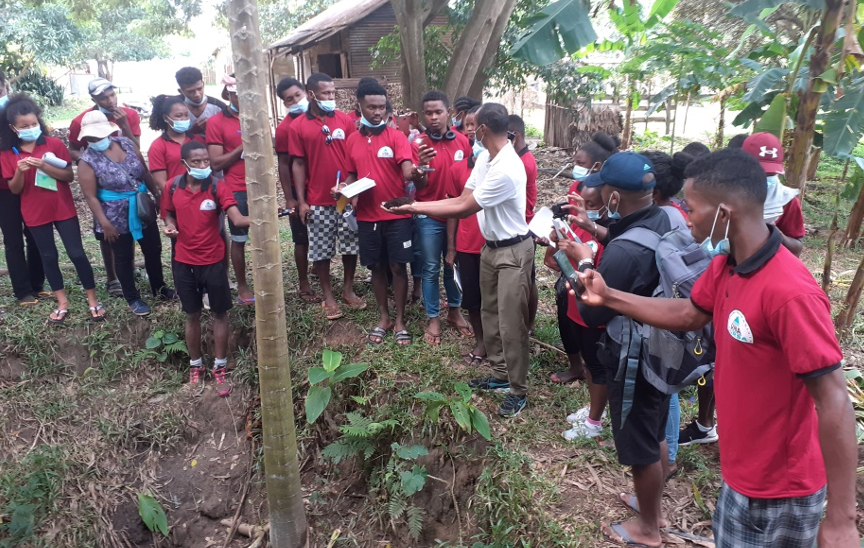
Michel Besinoa (in white shirt, middle), presenting what healthy soil looks like for all the diverse crops (10+) in his operation. CURSA students and staff (mostly in red CURSA polos) carefully took notes, videos, and audio recordings to capture the depth of knowledge Michel shared with them. Through decades of rigorous experimentation, Michel has independently developed his own approach to regenerative agriculture which has led him to success in cash and subsistence crop farming.
Next, students will visit the biggest coconut producer in the SAVA region, which is famous around the island for the quality of its coconuts. They are not only learning about coconut production, but also how to repurpose waste for useful products like compost, mulch, charcoal, and other purposes. They will then visit the New Generation School Garden, an educational demonstration site showcasing the links between people and nature. Stay tuned for more updates as the new academic year unfolds.
Vanilla is an important agricultural and economic engine in the SAVA region, and almost all farmers are interested in how to improve their productivity of this valuable cash crop. The DLC and CURSA have created a new partnership with one of the world leaders in vanilla production, Virginia Dare. DLC and Virginia Dare have been supporting the CURSA regenerative agriculture team and our lead farmers to engage in hands-on skills development workshops focused on best practices of vanilla agriculture. These week-long workshops have focused on regenerative agriculture as applied to vanilla, as well as diversifying agriculture to buffer farmers from the volatility in prices. Virginia Dare is also a leader in implementing Faire Trade and Certified Organic standards, spreading the positive impact of their footprint to new actors and regions in the SAVA region.
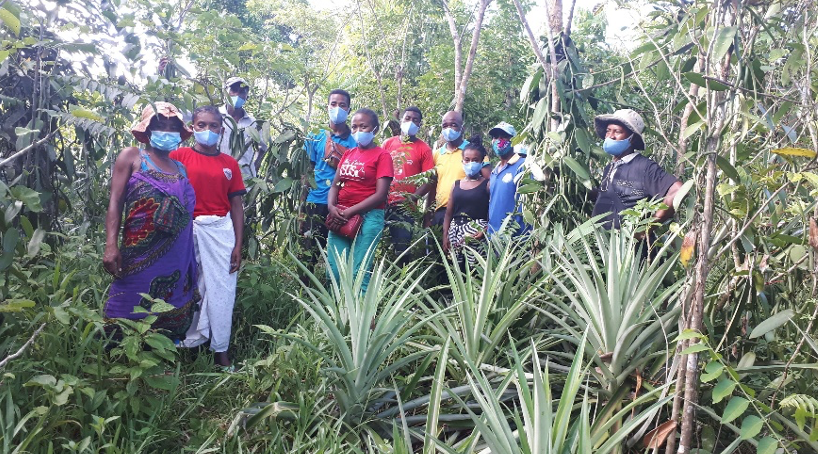
The CURSA Agroecology team has peer-to-peer exchange with the Virginia Dare Madagascar team, exploring how to integrate vanilla (vines hanging from trees) with food crops like pineapples (foreground).
We are extremely grateful to Dr. Manjaribe Christophe, Director of CURSA who oversees all our collaborative projects. Dr. Manjaribe has been a champion for biodiversity conservation and rural development and his role linking CURSA and DLC has been invaluable to our collaborations. We also thank Mr. Fulgence Thio Rosin, who has also co-created activities and projects with CURSA staff and students as well as diverse actors throughout the SAVA region. Mdm. Soazafy Marie Rolande has been a key partner contributing her expertise in many branches of the DLC-CURSA collaboration and we are indebted to her. From all our beneficiaries, we greatly appreciate the General Mills for supporting these activities.
1 Herrera, J. Sustainable agriculture for forest conservation in the SAVA region, <http://online.fliphtml5.com/ejvu/ftmg/#p=2> (2019).
2 World_Bank. Madagascar Economic Update: COVID-19 Increases Poverty, a New Reform Momentum is Needed to Build Back Stronger. < https://www.worldbank.org/en/country/madagascar/publication/madagascar-economic-update-covid-19-increases-poverty-a-new-reform-momentum-is-needed-to-build-back-stronger> (2020).
3 Reel, M. Vanillanomics, <https://www.bloomberg.com/features/2019-economics-of-vanilla-markets-madagascar/> (2019).
4 ARC_GIS. Madagascar Story Map, <https://www.arcgis.com/apps/MapJournal/index.html?appid=d80bf7a8bfca47cbb9a9bbf5f10edb21> (2021).
5 Razanatsoa, E. et al. Fostering local involvement for biodiversity conservation in tropical regions: Lessons from Madagascar during the COVID-19 pandemic. 53, 994-1003, doi:https://doi.org/10.1111/btp.12967 (2021).
6 Harding, A. Madagascar is on the brink of a climate-induced famine, <https://www.bbc.com/news/world-africa-58303792> (2021).
7 Herrera, J. Agroecology in Madagascar: DLC-SAVA Conservation interventions for sustainable development, <https://lemur.duke.edu/agroecology-in-madagascar/> (2020).
8 Herrera, J. DLC-SAVA Conservation Agroecology Workshops in Madagascar, <https://lemur.duke.edu/sava-agroecology-workshops/> (2020).
9 Herrera, J. Decade of Restoration in Madagascar, <https://lemur.duke.edu/restoration/> (2021).
10 Razafindrabozy, E., et al.. Women’s farmer association: Empowering women in sustainable agriculture, SAVA style, <https://lemur.duke.edu/women-in-agriculture/> (2021).
11 Rakotoarison, A. et al. Research Experience for Undergraduate Students in Madagascar, <https://lemur.duke.edu/student-research-part-1/> (2021).

